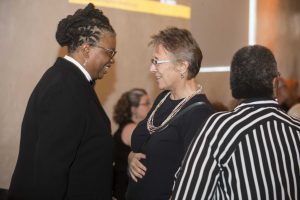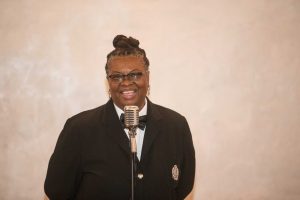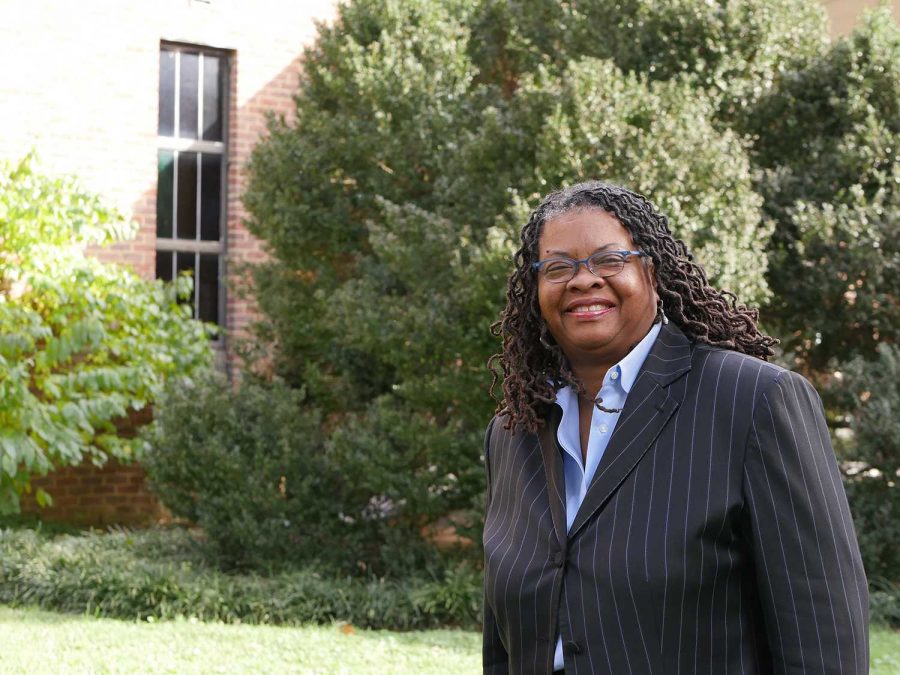When Teresa Smallwood was born in a small, agrarian town in North Carolina in 1959, there were two separate entrances to the hospital: one for colored people, and one for white people. Her elementary school was not integrated until the fifth grade, and in the sixth grade, the school was integrated by law, but most classrooms remained segregated.
In June, Smallwood came to the Vanderbilt Divinity School as a postdoctoral fellow and is the associate director of the new Public Theology and Racial Justice Collaborative, an initiative launched in September that is “committed to eradicating racism and all its reciprocal forms.” Her journey to get here, though, wasn’t exactly linear.
After Smallwood graduated high school, she began studying at UNC Chapel Hill for her undergraduate degree in speech communications and African and Afro-American history. She realized that racial injustice expands beyond the anti-black racism she experienced growing up in her home town.
“I came to understand that racial justice is not confined to a binary of black and white,” Smallwood said. “It is a question of how we treat others. And otherness is something that is symptomatic of what ails us in this country.”
After graduating from UNC in 1982, Smallwood attended law school at North Carolina Central University and went on to practice public interest law, working on cases involving housing evictions, benefits and other procedural situations. She moved to Charlotte to work at a specialty firm called the Children’s Law Center, where she learned more about the flaws in the foster system and had a short stint as a foster parent herself.
Otherness is something that is symptomatic of what ails us in this country.
While Smallwood was making strides in the field of activism, she had been repressing a “call” to the ministry, which she answered in 2007 when she began attending Howard University School for her Masters of Divinity.
“What I learned very quickly is that in the denomination that I love and I have cherished, the fullness of my ontology was never going to be accepted in that context,” Smallwood said. “And what I mean by that is as a black female member of the LGBTQ community, coming from where I come from, there was never ever going to be an opportunity that I could foresee where my skills, my gifts, my talents and my convictions would be completely accepted. And so I saw very clearly that Parish ministry was not going to be afforded to me. I needed to be able to function in a different space. And even though I consider the work I do right here as ministry, it is not conventional.”
After receiving her Masters in 2010, Smallwood began her PhD program at Chicago Theological Seminary, where she wrote and defended her dissertation entitled “The Leprosy Effect: The Treatment of Queers in the Black Preaching Tradition.”
She calls her acceptance to Vanderbilt “the opportunity of a lifetime” and has spent her first four months in Nashville making connections and forming relationships across the city, which she believes is the ideal place to be working on an initiative such as the new Public Theology and Racial Justice Collaborative.
“Nashville seems to be particularly situated to give the world an exemplar of what it could be like,” Smallwood said. “If people are innovative, if people are willing to think through what is the impact of building buildings to the poor people being displaced, and what is the impact of a person who is diabetic being homeless and not having anywhere to refrigerate their insulin, and what is the impact of a crowd of folk who live in substandard housing when what they see all around them is the “it” city coming alive. And what I like about Nashville is we have politicians here true to form, but they are also very willing to listen to the voice of the people.”
Our thing is being woke for justice: this idea that somewhere along the line, people must wake up: not just to be conscious but to act conscious.
The collaborative was born when the Divinity School received a $1 million grant from the Henry Luce Foundation to “bring together scholars, students, activists and public servants to study some of the nation’s most pressing issues surrounding racism.”
Emilie Townes, the Dean of the Divinity School, serves as the director of the collaborative, and Smallwood serves as the associate director, managing its day-to-day operations.
The collaborative focuses on using public theology as a means of bringing about racial justice. According to David Bromell of the University of Otago, public theology, in particular, is a form of applied theology which “reflects critically on the ethical and political implications, here and now, of claims expressed or implied in religious faith and witness, and does so in the public sphere, in publicly accessible ways.”
“Theology has a public narrative,” Smallwood said. “Most people have begun to confine their own faith and belief system to something very personal and individual. What public theology does is resist that individual narrative for a narrative that is much more open, much more lived, much more identifiable, in a fashion that is not confined necessarily to dogma. And don’t get me wrong, polity and dogma have their place, but we are looking for an infusion of belief systems that confine themselves to ‘What is the basic need of humanity?’”
The new initiative has three main goals, all focusing around its mission to connect individuals, institutions and organizations around the country who are working towards attaining racial justice. The collaborative also hopes to raise awareness about racial discrimination surrounding the November 2018 midterm elections.
“We don’t have a platform,” Smallwood said. “We’re not trying to move a particular agenda, we are trying to awaken people to what the circumstance is. Our thing is being woke for justice: this idea that somewhere along the line, people must wake up: not just to be conscious but to act conscious. There’s a lot of folks with opinions on what’s happening in the world, but an awakening that really causes one to act: that is what we are after.”

Firstly, the collaborative plans on hosting a two-week institute at Vanderbilt in June, where racial justice advocates from around the country can attend to discuss plans for the midterm elections, learn about how to interact with media about issues of racial justice and share their experiences. Smallwood is expecting around 150-200 attendees at the institute this summer, and estimates that it will grow by approximately 25 percent by summer 2020, when she expects it to transform into more of a leadership conference, she said.
“In the whole span of things, the word collaboration is so very key, and a good portion of my time is spent building collaborative partnerships,” Smallwood said. “The partnerships that we seek are multigenerational, interfaith, and multiethnic. We are seeking basically to bring the big tent together. I’ve spent the last four months building relationships.”
Secondly, Smallwood brings the ideas of the collaborative to speaking events around Nashville. Upcoming events Smallwood will be presenting at include the federal defenders office, Christians Under Faith and a conference called Transdisciplinary Pathways to Racial Justice. Smallwood views these “guest appearances” as a mechanism for further collaborating with the community and incorporating public theology into the greater conversation surrounding racial justice.
Thirdly, the collaborative gives out trans-institutional, individual grants of $250 to $1000 to professional and graduate students across all of the Vanderbilt schools to “explore small projects on public theology and racial justice.” Additionally, students in the Divinity School and Graduate Department of Religion are eligible to apply for grants of up to $1000 for “independent research projects related to public theology and racial justice.” The collaborative will present its first grant next month to a student from Peabody College.
 While Smallwood acknowledges that those who don’t believe in God or actively practice religion hear the word “theology” and tune out, she claims that we all have belief systems, whether they have to do with God or organized religion or not.
While Smallwood acknowledges that those who don’t believe in God or actively practice religion hear the word “theology” and tune out, she claims that we all have belief systems, whether they have to do with God or organized religion or not.
“For me, public theology and racial justice is a national marriage, but for academia in general it is not. It is a forced marriage in that theological thinking has in large measure remained in the ivy tower of academentia, and what this project seeks to do is to break it out of its boundaries and really make the considerable wealth of knowledge that comes through these halls something apropo, something applicable, something that can be digested to the average person.”

